Physical Education
Vision
We aim to inspire our pupils to develop their physical, emotional and social health and wellbeing through engaging in challenging and meaningful experiences that motivate them to be active for life.
ME in Plymstock School PE is an innovative approach to overtly teach personal development through the vehicle of sport. Our ethos in PE is simple; we want to fully equip our students with the skills they need to meet the challenges of the future, whatever they may be. We want our students to acquire a clear understanding of health and wellbeing and an enjoyment for physical activity with the aim that they develop positive habits that they continue to engage in for life.
We recognise that not every student shares an intrinsic motivation for sport and competition and although we endeavour to nurture a sporting excellence where it is appropriate, we also understand that this approach can often be a barrier for many. We aim to engage ALL young people in physical activity. As PE teachers we have a unique and moral responsibility to nurture and promote a positive relationship with physical activity – something which will have a direct impact on the wellbeing of every student and ultimately affect their quality of life.
Our core aims are to develop transferable life skills within a safe environment through the vehicle of sport and physical activity. We have developed the 5 MEs in Plymstock School PE as a model that allows all students to engage, progress and succeed. Our physical development aims will be delivered in line with these 5 MEs:
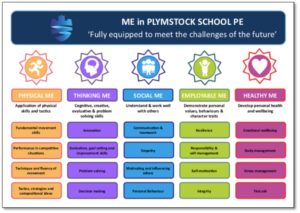
Each half term pupils will follow a different sport or activity and within this the focus will be on improving their physical skills as well as developing one of the other MEs. Each lesson will therefore have a Physical ME objective and a personal development objective. For example, pupils may spend one half term following football as an activity and focussing on integrity as an aspect of Employable ME. A typical lesson may have the Physical ME objective of ‘Developing the dribble’ and an Employable ME objective of ‘demonstrating fair play and sportsmanship’.
This new approach aims to add value to our PE programme without compromising on the things we have traditionally done so well. We aim to highlight how influential physical activity can be in the development of personal qualities and key life skills and in turn create well rounded students who are healthier, happier and more prosperous.
Core Knowledge
Year 7
To develop the Plymstock culture and become a valued member of the PE and Plymstock School community. To understand how the development of physical skills through practical performance can contribute to the development of the whole person.
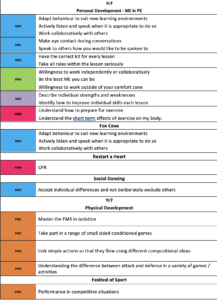
Year 8
To develop an understanding of the impact my actions and attitude can have on others. To appreciate how I can contribute to a positive learning environment.
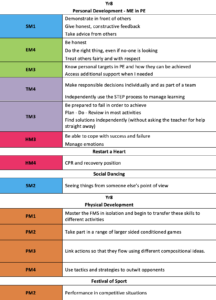
Year 9
To experience a variety of leadership roles across a range of activities. To develop the ability to add value to others and improve their success whilst gaining an appreciation of the importance of these skills for the future.
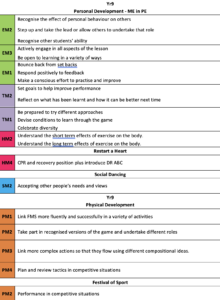
Year 10
To effectively model the Plymstock culture in all actions and behaviours. To understand the importance of physical activity when striving for to achieve excellence in all aspects of the curriculum.
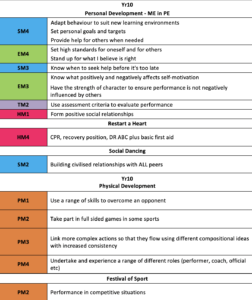
Year 11
To develop the knowledge, understanding and confidence to participate in an active and healthy lifestyle beyond school. To recognise triggers that identify changes in wellbeing and understand how to address them.
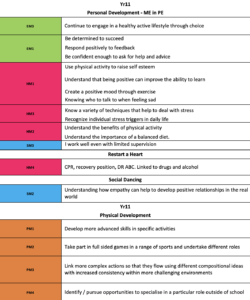
GCSE Sport Studies
Year 10
Our GCSE in Physical Education equips pupils with the knowledge, skills and understanding they need to develop their own performance in sport. They develop their understanding of socio-cultural influences on participation in sport, and the benefits of physical activity to health, fitness and well-being. Pupils explore how parts of the human body function during physical activity and the physiological adaptations that can occur due to diet and training. They also develop skills in data analysis, and an understanding of the principles of training, why we train in different ways and how training plans can be made to optimise results.
Core knowledge to be learnt in Year 10:
Applied anatomy and physiology
- Skeletal System
- Muscular system
- Cardiovascular system
- Respiratory system
- Short and long term effects of exercise of the body systems
- Movement Analysis (including Levers, Planes and Axes)
Physical training
- Components of fitness
- Applying the principles of training
- Preventing injury
Psychology of sport
- Characteristics of skilful movement / classification of skill
- Goal setting
- Mental preparation
- Types of guidance and feedback
Year 11
Pupils develop their knowledge of the social-cultural and psychological influences on levels of participation in sport, and also how sport impacts on society more broadly. This includes the individual benefits to health, fitness and well-being of participating in physical activity, as well as the influences of commercialisation, sponsorship and the media.
Core knowledge to be learnt in Year 11:
Socio-cultural influences
- Engagement patterns of different social groups in physical activity and sport
- Commercialisation of sport
- Ethical and socio-cultural issues in sport
Health, fitness and well-being.
- General health, fitness and wellbeing
- Diet and nutrition
Analysis and evaluation of performance (AEP)
- Pupils are also required to complete a written piece of coursework during Year 11. They must be able to demonstrate their ability to analyse and evaluate their own or a peer’s practical performance to produce an action plan for improvement.
A Level Physical Education
The A-level looks to build on the fundamental knowledge that has been acquired at GCSE and develop the pupils’ evaluation and analysis skills across a range of topics.
Year 12
Pupils learn how the body systems play an integral role in all sports performance before considering the link this then has with skill development. Diet and nutrition, biomechanics and the place of sport in society all add to the breadth of topics.
Core knowledge to be learnt in Year 12:
- Cardiovascular system
- Respiratory system
- Neuromuscular system
- The musculo-skeletal system and analysis of movement
- Skill acquisition
- Sport and society
- Emergence of globalisation of sport in the 21st century
- The impact of sport on society and of society on sport
- Diet and nutrition
- Biomechanical principles
- The role of technology in physical activity and sport
Year 13
The focus of study switches to the elite level performer and the preparation, performance and recovery involved at this level of competition. Pupils develop their understanding of the fine margins involved in winning and losing through the study of sports psychology, exercise physiology and contemporary issues in modern day sport.
Core knowledge to be learnt in Year 13:
- Energy systems
- Information processing
- Injury prevention and the rehabilitation of injury
- Further biomechanical movement
- Sports Psychology
- Development of elite performers in sport
- Ethics in sport
- Violence in sport
- Drugs in sport
- Sport and the law
- Impact of commercialisation on sport and the media
Written non-examined assessment (NEA)
Pupils are also required to complete a written piece of coursework during Yr13. They must be able to demonstrate their ability to analyse a technical or tactical error in a performance, suggest possible causes for this and then plan in detail how this can be corrected.
Practical performance (NEA)
Over the duration of the course students must film at least one performance in a fully competitive situation (E.g. competition, league game, tournament etc.) This DVD will then be used to award a grade for the practical component of the course.